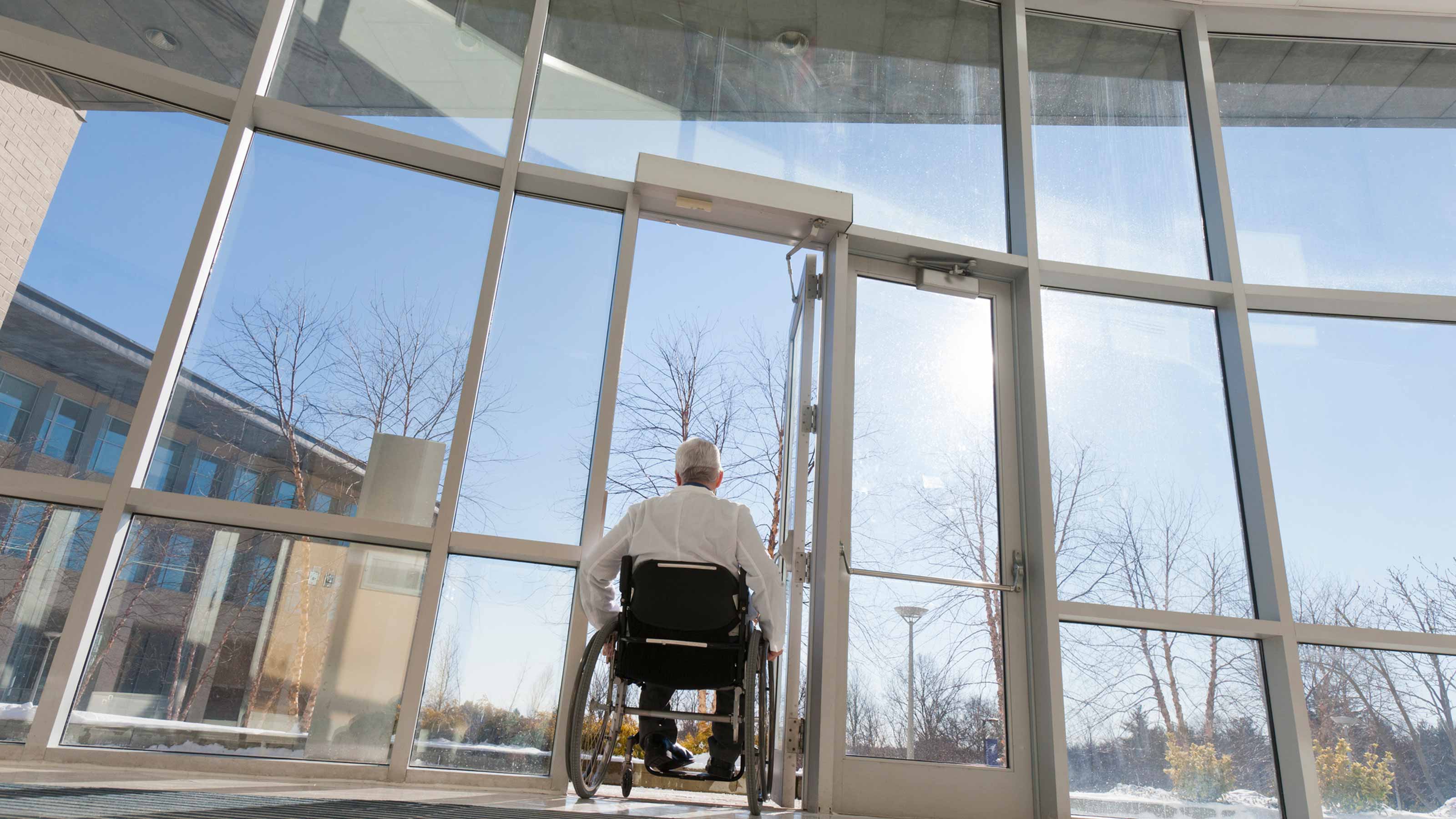Applying for Disability Benefits While the SSA Offices Remain Closed
Getting Social Security Disability benefits isn’t easy, and with Social Security Administration offices closed, it can be even tougher. Here are some tips to improve your chances.


Profit and prosper with the best of Kiplinger's advice on investing, taxes, retirement, personal finance and much more. Delivered daily. Enter your email in the box and click Sign Me Up.
You are now subscribed
Your newsletter sign-up was successful
Want to add more newsletters?

Delivered daily
Kiplinger Today
Profit and prosper with the best of Kiplinger's advice on investing, taxes, retirement, personal finance and much more delivered daily. Smart money moves start here.

Sent five days a week
Kiplinger A Step Ahead
Get practical help to make better financial decisions in your everyday life, from spending to savings on top deals.

Delivered daily
Kiplinger Closing Bell
Get today's biggest financial and investing headlines delivered to your inbox every day the U.S. stock market is open.

Sent twice a week
Kiplinger Adviser Intel
Financial pros across the country share best practices and fresh tactics to preserve and grow your wealth.

Delivered weekly
Kiplinger Tax Tips
Trim your federal and state tax bills with practical tax-planning and tax-cutting strategies.

Sent twice a week
Kiplinger Retirement Tips
Your twice-a-week guide to planning and enjoying a financially secure and richly rewarding retirement

Sent bimonthly.
Kiplinger Adviser Angle
Insights for advisers, wealth managers and other financial professionals.

Sent twice a week
Kiplinger Investing Weekly
Your twice-a-week roundup of promising stocks, funds, companies and industries you should consider, ones you should avoid, and why.

Sent weekly for six weeks
Kiplinger Invest for Retirement
Your step-by-step six-part series on how to invest for retirement, from devising a successful strategy to exactly which investments to choose.
When the COVID-19 pandemic began in earnest in spring 2020, the Social Security Administration (SSA), along with scores of businesses, was forced to close about 1,200 field offices and transition thousands of employees to remote work status practically overnight. For well over a year, it was unclear when or how the offices would reopen as the world waited and watched the trajectory of the virus.
The SSA offices have remained mostly closed to the public, though they offer limited in-person services for people with “dire” needs. This has caused difficulty for the millions of Americans with disabilities who rely on the responsiveness of the SSA and its employees to apply for and receive their Social Security Disability (SSDI) benefits following a work-disrupting disability. Recent negotiations have led to a revised, but still tentative reopening date of March 30, 2022, over two full years since the field offices initially closed.
If you are one of the millions of people waiting for updates on your application or approval status, here are some tips to maximize your chances of success.
From just $107.88 $24.99 for Kiplinger Personal Finance
Become a smarter, better informed investor. Subscribe from just $107.88 $24.99, plus get up to 4 Special Issues

Sign up for Kiplinger’s Free Newsletters
Profit and prosper with the best of expert advice on investing, taxes, retirement, personal finance and more - straight to your e-mail.
Profit and prosper with the best of expert advice - straight to your e-mail.
Apply for SSDI Immediately.
There is no time to lose when it comes to applying for SSDI. Due to the field offices being closed, the administration is seeing a significant backlog. The initial application can take three to six months to review, and typically only about one in three applications are approved.
Waiting until the SSA field offices reopen to apply will only hurt your financial situation, and possibly your savings and retirement fund, especially if you have no other regular income.
If you are thinking about applying for SSDI, check the categories of eligible disabilities online to see if you are eligible to receive the benefits you deserve and earned while working.
Use a representative to get help early.
Applying for SSDI is a multistage process that can be incredibly complex and can prove to be both physically and mentally exhausting. Many applications fail to get approved simply because the applicant did not submit all the required documentation. Having an experienced, dedicated representative advocating for you can make a huge difference in getting your application and claims approved in a timely manner.
This is especially true since SSA’s operational process has grown more complicated on a state-by-state level, with different state Disability Determination Services (DDS) offices taking different approaches to managing workloads. An effective representative should be familiar with the policies and procedures of the SSA, can advocate for you and your particular disability, and can help ensure that all necessary forms and documents are in order, properly completed and submitted electronically to the federal agency.
Create a budget and adjust your spending habits accordingly.
As described above, it is likely going to take some time for the SSA’s offices and staff to get back up to speed once they reopen. This may mean needing to go for longer than expected without receiving a benefits payment. Looking at your finances and creating a budget could help you live beneath your means and remain financially secure for an interim period while the SSA processes your paperwork.
If you still find yourself coming up short financially, consider searching for community and social or faith-based organizations that may be willing to provide temporary assistance, helping out by providing food or funds for housing, utilities and other expenses.
Keep your health insurance.
With expected delays, it might be tempting to opt out of health insurance. However, having medical evidence is critical to support your claims. The lack of medical records could be a reason why your application gets denied. Therefore, you should consider your health insurance options, such as COBRA, Health Insurance Marketplace plans or Medicaid.
If you need to stop paying for health insurance premiums due to cost or other circumstances, then look for low-cost or free health care clinics serving your area. You can find a list at the federal website: FindAHealthCenter.hrsa.gov.
Profit and prosper with the best of Kiplinger's advice on investing, taxes, retirement, personal finance and much more. Delivered daily. Enter your email in the box and click Sign Me Up.

Steve Perrigo, J.D., is Vice President, Sales and Account Management, for Allsup and has over two decades of experience and knowledge of the Social Security Administration (SSA) and its programs. He joined Allsup in August 2010 and helps clients understand their options when coordinating private disability insurance benefits with the Social Security program. Prior to joining Allsup, Steve Perrigo spent 17 years with the SSA in various roles of increasing responsibility.
-
 How Much It Costs to Host a Super Bowl Party in 2026
How Much It Costs to Host a Super Bowl Party in 2026Hosting a Super Bowl party in 2026 could cost you. Here's a breakdown of food, drink and entertainment costs — plus ways to save.
-
 3 Reasons to Use a 5-Year CD As You Approach Retirement
3 Reasons to Use a 5-Year CD As You Approach RetirementA five-year CD can help you reach other milestones as you approach retirement.
-
 Your Adult Kids Are Doing Fine. Is It Time To Spend Some of Their Inheritance?
Your Adult Kids Are Doing Fine. Is It Time To Spend Some of Their Inheritance?If your kids are successful, do they need an inheritance? Ask yourself these four questions before passing down another dollar.
-
 The 4 Estate Planning Documents Every High-Net-Worth Family Needs (Not Just a Will)
The 4 Estate Planning Documents Every High-Net-Worth Family Needs (Not Just a Will)The key to successful estate planning for HNW families isn't just drafting these four documents, but ensuring they're current and immediately accessible.
-
 Love and Legacy: What Couples Rarely Talk About (But Should)
Love and Legacy: What Couples Rarely Talk About (But Should)Couples who talk openly about finances, including estate planning, are more likely to head into retirement joyfully. How can you get the conversation going?
-
 How to Get the Fair Value for Your Shares When You Are in the Minority Vote on a Sale of Substantially All Corporate Assets
How to Get the Fair Value for Your Shares When You Are in the Minority Vote on a Sale of Substantially All Corporate AssetsWhen a sale of substantially all corporate assets is approved by majority vote, shareholders on the losing side of the vote should understand their rights.
-
 How to Add a Pet Trust to Your Estate Plan: Don't Leave Your Best Friend to Chance
How to Add a Pet Trust to Your Estate Plan: Don't Leave Your Best Friend to ChanceAdding a pet trust to your estate plan can ensure your pets are properly looked after when you're no longer able to care for them. This is how to go about it.
-
 Want to Avoid Leaving Chaos in Your Wake? Don't Leave Behind an Outdated Estate Plan
Want to Avoid Leaving Chaos in Your Wake? Don't Leave Behind an Outdated Estate PlanAn outdated or incomplete estate plan could cause confusion for those handling your affairs at a difficult time. This guide highlights what to update and when.
-
 I'm a Financial Adviser: This Is Why I Became an Advocate for Fee-Only Financial Advice
I'm a Financial Adviser: This Is Why I Became an Advocate for Fee-Only Financial AdviceCan financial advisers who earn commissions on product sales give clients the best advice? For one professional, changing track was the clear choice.
-
 I Met With 100-Plus Advisers to Develop This Road Map for Adopting AI
I Met With 100-Plus Advisers to Develop This Road Map for Adopting AIFor financial advisers eager to embrace AI but unsure where to start, this road map will help you integrate the right tools and safeguards into your work.
-
 The Referral Revolution: How to Grow Your Business With Trust
The Referral Revolution: How to Grow Your Business With TrustYou can attract ideal clients by focusing on value and leveraging your current relationships to create a referral-based practice.